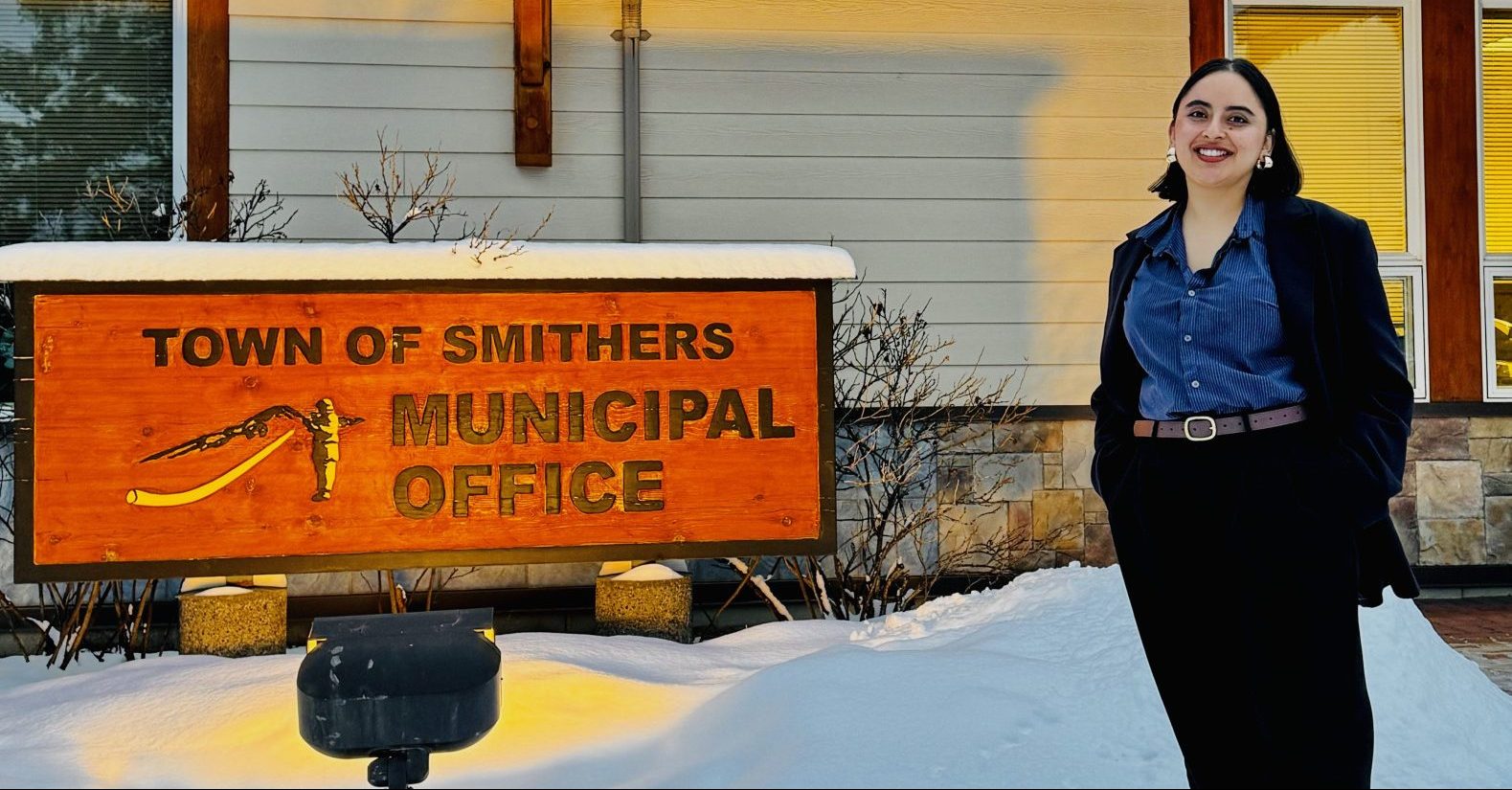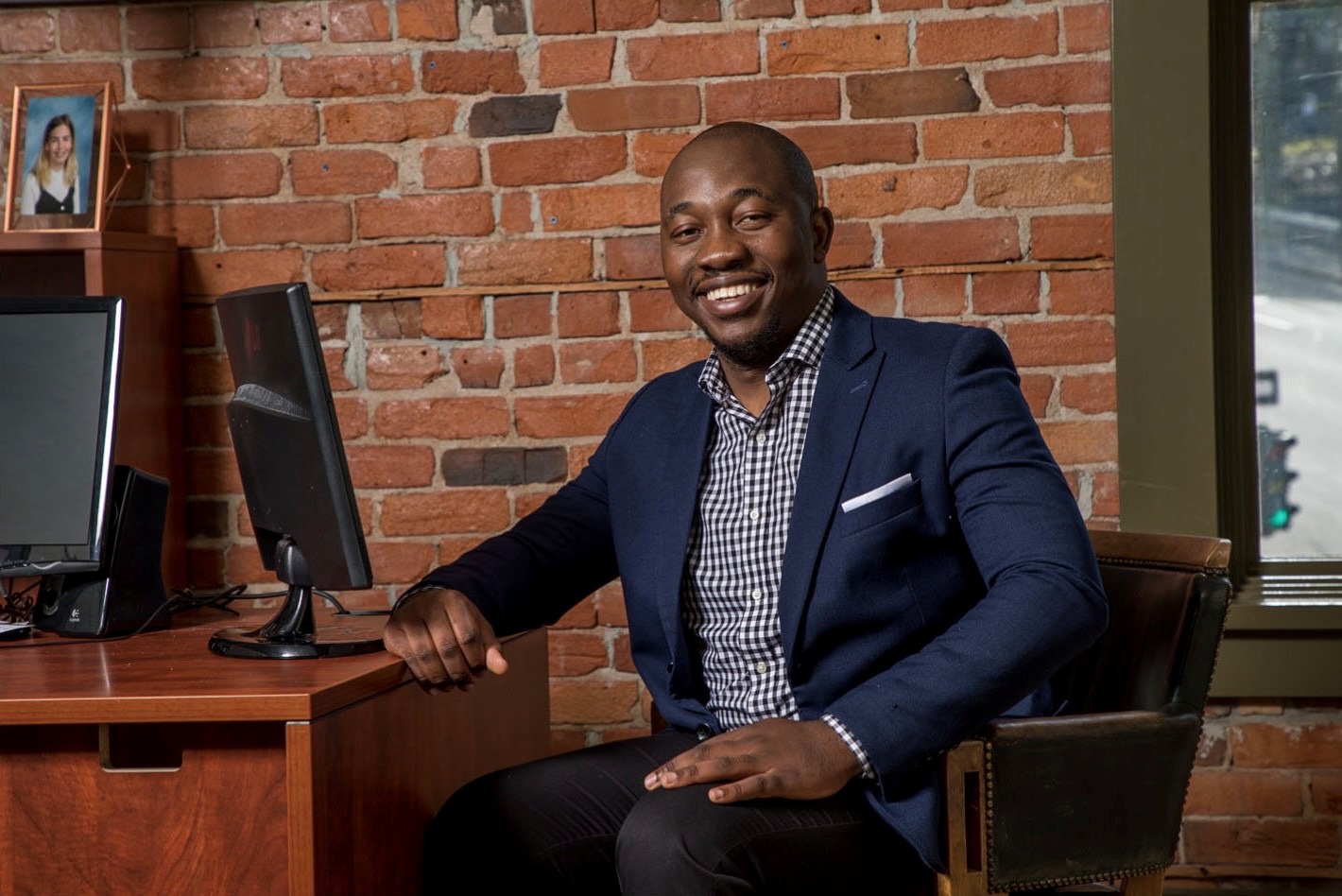
Research fellow program reduces carbon footprints
By Élise Fenwick
Net-Zero emissions by 2050; this is Canada’s lofty, yet necessary goal to help keep the world safe for future generations.
A few Thompson Rivers University (TRU) graduate students — including Nji Mbitaownu (MScEEM ’24) and Samikshya Paudel (MScEEM ’24) — have made it so this goal has become a little more achievable.
Mbitaownu and Paudel — both alumni of the Master of Science in Environmental Economics and Management (MScEEM) program — were interested in applying sustainability frameworks to real-world challenges and gaining hands-on experience that would add to their professional expertise. TRU’s Bob Gaglardi School of Business and Economics offers graduate students pursuing their MScEEM and Master of Business Administration (MBA) degrees the chance to do just that through the Community Carbon Accounting Program (C2AP).
“The C2AP provides students with an opportunity to learn additional knowledge and a new set of skills while also providing them with practical real world work experience, and this is very valuable on their resumé,” says economics Professor Dr. Laura Lamb. “These skills can be used in local and global settings as our graduates move forward in their career path.”
Measuring carbon footprint
Established in 2020 through a partnership with the Interior University Research Coalition and generously sponsored by TELUS, the C2AP pairs graduate research fellows with businesses or non-profits that want to learn about their carbon emissions and reduce their carbon footprint.
“Businesses need a snapshot of how their operations are doing in terms of energy efficiency and GHG emissions,” Paudel says. “They have a responsibility to make sure they’re not degrading the planet we all share.”
Four businesses and/or organizations are selected each year to work with TRU’s TELUS Sustainability Research Fellows, who monitor and measure their carbon levels and provide recommendations for carbon reductions and energy savings. The research fellows essentially act as a carbon accounting consultant to partnering businesses or organizations.
“The fellowship is competitive,” Lamb says, explaining that only four graduate students are chosen each year.
In 2023, Paudel was one of four graduate students to receive the TELUS Sustainability Research Fellowship while Mbitaownu was a 2024 recipient.
“I chose to participate in the C2AP because its focus on carbon accounting and its potential to drive meaningful environmental change resonated with my academic interests and career goals in environmental economics and economic development,” Mbitaownu says.
Strengthening community relationships

Nji Mbitaownu in his office at Venture Kamloops, where he looks at issues through a lens of sustainability in his role as economic development specialist.
Mbitaownu worked with Kamloops Kia to conduct a greenhouse gas inventory and identify key sources of the company’s emissions. He completed his research fellowship in August 2024.
“This foundational study provided them (Kamloops Kia) with a clear understanding of their emissions profile,” Mbitaownu says. “Quantifying their total emissions established a benchmark for tracking progress and identifying priority areas for reduction. These findings equipped them with a roadmap for making informed decisions about their sustainability efforts, setting the stage for long-term environmental and operational improvements while ensuring financial viability through long-term cost savings and available government incentives.”
Working with the local second-generation, family-owned company Riversong Guitars, Paudel was also able to provide the company with perspective on how to make its business more sustainable using rebates and incentive programs while reaching greenhouse gas (GHG) emission goals.
“The world is shifting towaré businesses being better stewards of the environment,” Paudel says. “Looking at energy consumption and GHG emissions helps businesses identify their biggest polluters, which are also usually the biggest contributors to their costs.”
Benefiting local business
Kamloops Kia, Riversong Guitars and other businesses that partner with the C2AP receive a report with information that will help them work toward carbon neutrality.
“The recommendations include costs and an estimation of how long it will take to recover an investment in green practices,” Lamb explains. “The participating organizations not only learn how to reduce their carbon footprint but also play an important role in mitigating climate change.”
Mbitaownu believes businesses participating in the C2AP gain tremendous value.
“By partnering with the program, businesses receive actionable recommendations to reduce emissions, improve operational efficiency and enhance their sustainability credentials, all while aligning with government incentives and industry standards,” Mbitaownu says. “Participation also demonstrates their commitment to environmental stewardship, which can strengthen their brand and appeal to eco-conscious customers.”
When approached to partner with the C2AP, Red Beard Café owner Mitchell Forgie saw it as a great opportunity to have a fresh, non-partisan set of eyes review his business.
“It’s common that business owners have a side project to dig deeper into their business’s effectiveness and efficiency but don’t end up having the time or energy to prioritize that type of research,” Forgie says. “Programs like this allow for some insight and research to be conducted and applied.”
“I think this is a great way (for TRU Gaglardi) to reach out and build relationships in the community.”
The lens of sustainability
Relationship building and understanding local economic dynamics are integral aspects of Mbitaownu’s current position as the economic development specialist with Venture Kamloops, a job he began shortly after completing the C2AP.
While his new role does not have a direct focus on sustainability, Mbitaownu says the MScEEM program and his involvement in the C2AP have changed his perspective as a business professional.
“I now see through a lens of sustainability that influences how I view and support businesses,” Mbitaownu says. “This perspective helps me consider long-term impacts and opportunities for sustainable growth in economic development…allowing me to contribute meaningfully to the economic prosperity of Kamloops.”
Paudel’s current position as the climate action specialist for the Town of Smithers, B.C., allows her to contribute to her local community.
“A big part of my job is to monitor and report CO2e (carbon dioxide equivalent) to the provincial government and regulatory bodies and project manage energy efficiency and GHG reduction projects in the community,” Paudel says. “The most impactful step towards driving real change in sustainability and climate change is to provide younger generations with the necessary tools to measure and assess these issues. This is exactly what the C2AP program provides to students.”
An invaluable experience for a valuable world
The C2AP provided Mbitaownu, Paudel and many other graduate research fellows with an invaluable experience, exposing them to the real-world challenges businesses face in reducing their carbon footprint and aligning with government standards. These students enter the job market equipped with analytical, research and project management skills that are guided by a mindset of sustainability, which is essential for future-focused careers.
Considering ever increasing global sustainability standards — such as the Canadian government’s mandatory climate-related financial disclosures for large companies — the business world has to become increasingly transparent and responsible for its environmental impact. Programs like TRU’s C2AP, produce graduates who are poised to support these businesses in meeting sustainability standards.
“As a world leader in sustainability,” Lamb explains, “TRU is training students to help shape the future with the knowledge and skills they’ve learned in our academic programs and value-added experiences like this fellowship.”
Corporate sponsorship is integral to the viability of the C2AP program, which Lamb explains provides not only an excellent opportunity for TRU’s graduate students and the community, but also the sponsors themselves.
“Any major business valuing sustainability will benefit from playing an important role in addressing climate change and will benefit by having its name associated with the C2AP,” Lamb says.
Organizations interested in supporting the future of sustainable business, while improving their green credentials and reputation, are encouraged to reach out to TRU Gaglardi’s Project Manager Kate Morford for more information about sponsoring new sustainability research fellowships.
